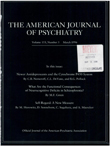Personality test scores as predictors of alcoholism almost a decade later
Abstract
OBJECTIVE: Comparisons of alcoholic and control subjects have revealed potential differences on a variety of personality tests. However, these results are difficult to interpret because subgroups of alcoholic subjects with antisocial personality disorder were often included in the overall analyses, and because testing was usually carried out while alcoholic subjects were in withdrawal. This article evaluates whether individuals' personality test scores at approximately age 20 predict their risk of subsequent development of alcohol abuse or dependence by about age 30. METHOD: As part of a larger prospective study of sons of alcoholic and control subjects, subsets of up to 78 subjects (39 matched pairs) out of a sample of 223 men took various personality tests that included the Eysenck Personality Inventory, subtests of the MMPI, and evaluations of locus of control and anxiety. An average of more than 9 years later, the incidence of alcohol abuse or dependence in these 223 subjects was determined by structured interviews. RESULTS: The 55 men who subsequently went on to develop alcohol abuse or dependence did not differ on any of the personality tests from the 168 men who did not develop alcoholism. CONCLUSIONS: These data are consistent with prospective studies indicating that except for antisocial personality disorder, it is difficult to identify a reliable personality profile associated with an individual's risk of alcoholism.
Access content
To read the fulltext, please use one of the options below to sign in or purchase access.- Personal login
- Institutional Login
- Sign in via OpenAthens
- Register for access
-
Please login/register if you wish to pair your device and check access availability.
Not a subscriber?
PsychiatryOnline subscription options offer access to the DSM-5 library, books, journals, CME, and patient resources. This all-in-one virtual library provides psychiatrists and mental health professionals with key resources for diagnosis, treatment, research, and professional development.
Need more help? PsychiatryOnline Customer Service may be reached by emailing [email protected] or by calling 800-368-5777 (in the U.S.) or 703-907-7322 (outside the U.S.).



